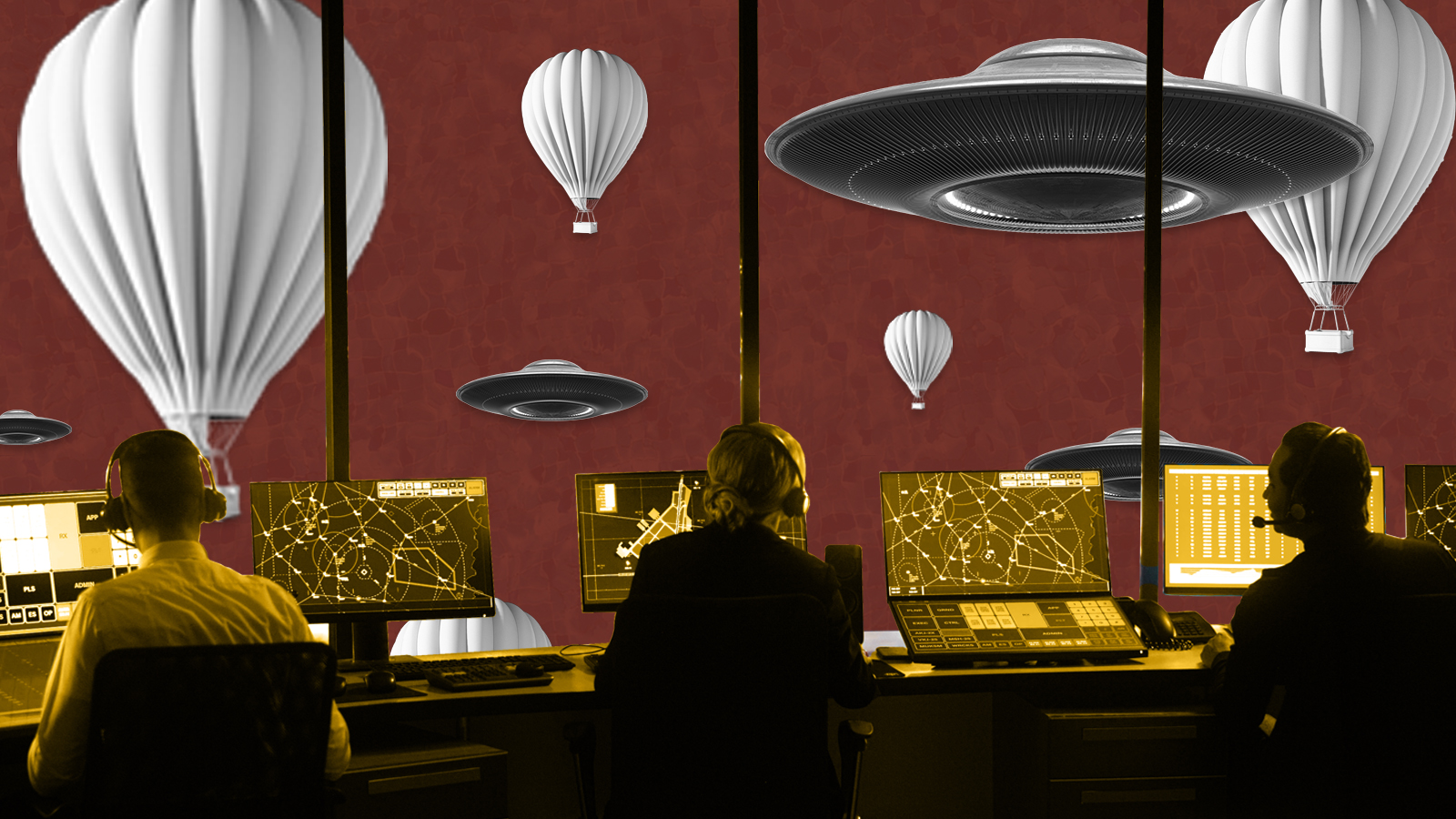Why the U.S. keeps shooting down 'unidentified objects'
Is it the Chinese? Or aliens? Explanations are few.


A free daily email with the biggest news stories of the day – and the best features from TheWeek.com
You are now subscribed
Your newsletter sign-up was successful
What are the unidentified objects that keep appearing in North American skies? A week after a U.S. fighter brought down a Chinese surveillance balloon off the coast of South Carolina, several more "unidentified airborne objects" have been identified — and shot down — over the United States and Canada. But details on what those objects are and where they are from are elusive, CNN reports. The "deepening national security mystery" comes amidst a "tense global situation" as American tensions with China and Russia are on the rise. "What's gone on in the last two weeks or so, 10 days, has been nothing short of craziness," Sen. Jon Tester (D-Mont.) said on CBS News this week. Why are there suddenly so many unidentified objects in the air? Are they aliens? Here's everything you need know:
What's going on?
A lot. Over Super Bowl weekend, a U.S. fighter brought down an unidentified object over Lake Huron — the fourth such flying object to be brought down in a week, Politico reports. The first was the original Chinese balloon, followed by objects shot down over Alaska, Canada, and Lake Huron. The Alaska object was probably not a balloon, officials said, because it broke up into pieces when the American missile hit it. But the other two objects were likely balloons. That doesn't necessarily mean they're all surveillance devices, though: Officials have speculated that some of the unidentified craft really are weather balloons. They could still pose a threat, though. The object brought down over Alaska was traveling at 40,000 feet — making it a "risk to civilian traffic," CNN reports. If American officials have a definitive idea of what the three most recent objects are or where they come from, they're not saying. But China, naturally, looms as the prime suspect.
Why are these objects suddenly appearing in our skies?
It might be because we're looking. After the first Chinese balloon was shot down, Reuters reports, the U.S. adjusted its radar tracking to detect flying objects that are "smaller, slower and differently shaped than the enemy aircraft and missiles that have long preoccupied the Pentagon." When you look more, you find more stuff. "We have been more closely scrutinizing our airspace at these altitudes, including enhancing our radar, which may at least partly explain the increase," Melissa Dalton, assistant defense secretary for homeland defense, told The Associated Press. Meanwhile, The Washington Post adds that the process is sort of like "unchecking boxes on a website to broaden the parameters of what can be searched." Right now, America's radar boxes are all unchecked. The flip side of this explanation, though, is that it suggests there was already a lot more stuff above our heads than we knew.
The Week
Escape your echo chamber. Get the facts behind the news, plus analysis from multiple perspectives.

Sign up for The Week's Free Newsletters
From our morning news briefing to a weekly Good News Newsletter, get the best of The Week delivered directly to your inbox.
From our morning news briefing to a weekly Good News Newsletter, get the best of The Week delivered directly to your inbox.
Tell the truth: Are they aliens?
Probably not? But at least one U.S. official is refusing to say definitely not. Reuters reports that Air Force General Glen VanHerck is refusing to rule out any possibility — including life from other planets. "I'll let the intel community and the counterintelligence community figure that out," he says. "I haven't ruled out anything." Other officials, though, say we're probably not in the early stages of a real-life Independence Day sequel. The real answer is probably much more mundane. "What's happening now is you have low-end technology being used to harass America," Luis Elizondo, who once ran the military's UFO program, tells The New York Times. "It is a high-impact, low-cost way for China to do this, and the more you look up in the sky, the more you will see." That probably won't stop the internet from making memes about the possibility.
What do the Chinese say?
They say they're not the only ones with balloons. Foreign Ministry spokesperson Wang Wenbin said this week that the United States had flown high-altitude balloons through its airspace at least 10 times over the last year, The Wall Street Journal reports. Officials did not say how China reacted to the overflights, and American officials said that the claims were false."We are not flying balloons over China," the National Security Council's John Kirby said on MSNBC. But it's clear that after being blamed for the first balloon over the United States — and subsequent reports that China has also sent balloons over Taiwanese airspace and the Middle East — that Beijing no longer feels like having all the fingers pointed exclusively its way. "The first thing the U.S. needs to do is change its ways and reflect on itself, and not to smear and incite confrontation," said Wang.
What's next?
Politics, both domestic and global. The balloon incident has already added to trade tensions with China, Politico reports, after the U.S. added "six Chinese aerospace companies to a trade blacklist" thanks to their involvement in surveillance. Back in the United States, there is no shortage of voices calling for America to take a more hawkish stance toward China — and criticizing President Biden's leadership on the issue. How this eventually affects America's domestic politics is still up in the air.
A free daily email with the biggest news stories of the day – and the best features from TheWeek.com
Joel Mathis is a writer with 30 years of newspaper and online journalism experience. His work also regularly appears in National Geographic and The Kansas City Star. His awards include best online commentary at the Online News Association and (twice) at the City and Regional Magazine Association.
-
 What are the best investments for beginners?
What are the best investments for beginners?The Explainer Stocks and ETFs and bonds, oh my
-
 What to know before filing your own taxes for the first time
What to know before filing your own taxes for the first timethe explainer Tackle this financial milestone with confidence
-
 The biggest box office flops of the 21st century
The biggest box office flops of the 21st centuryin depth Unnecessary remakes and turgid, expensive CGI-fests highlight this list of these most notorious box-office losers
-
 Despairing husband creates 'Taylor Swift jar'
Despairing husband creates 'Taylor Swift jar'Tall Tales And other stories from the stranger side of life
-
 Urine video dents Chinese beer brand
Urine video dents Chinese beer brandTall Tales And other stories from the stranger side of life
-
 Is the 'vibecession' over?
Is the 'vibecession' over?Speed Read The IMF reported that the global economy is looking increasingly resilient. Is it time to start celebrating?
-
 The U.S. veterinarian shortage crisis
The U.S. veterinarian shortage crisisSpeed Read With an anticipated shortage of 15,000 vets by 2030, it will be harder to get care for pets
-
 Inside Russia's war crimes
Inside Russia's war crimesSpeed Read Occupying forces in Ukraine are accused of horrific atrocities. Can they be held accountable?
-
 10 things you need to know today: July 8, 2023
10 things you need to know today: July 8, 2023Daily Briefing White House defends controversial delivery of cluster bombs to Ukraine, Yellen urges economic harmony between China and US, and more
-
 Is it safe to ride a roller coaster?
Is it safe to ride a roller coaster?The Explainer A pair of startling events have shined a light on amusement park safety
-
 World leaders who have been charged or imprisoned
World leaders who have been charged or imprisonedThe Explainer Heads of state being put behind bars is not a rare occurrence
